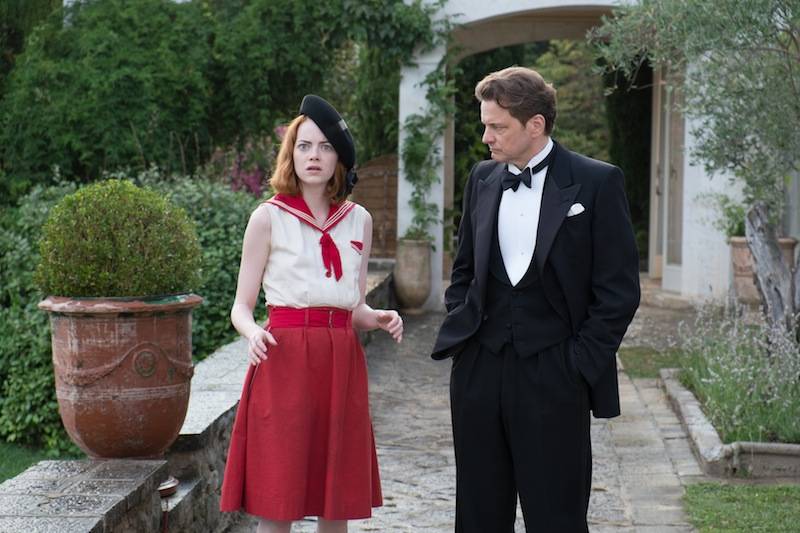
Emma Stone and Colin Firth in Magic in the Moonlight.
Review – Magic in the Moonlight
– by Thalia Stopa
Woody Allen and myself have two common infatuations: the Roaring Twenties and the occult. It would seem then that we are the ideal pairing of movie-lover/viewer and filmmaker, especially this week’s release, Magic in the Moonlight.
The latest from the writer/director is set mostly in the Cote d’Azur circa 1928, and centres around the illusionist Wei Ling Soo (aka Stanley Crawford, played by Colin Firth). His mission, as solicited by his best friend and fellow magician Howard (Simon McBurney) is to expose the young psychic Sophie Baker (Emma Stone) as a fraud before she marries Brice (Hamish Linklater).
Allen has explored the theme of magic before, most recently in Scoop and Midnight In Paris. In the former he cast himself as a somewhat pathetic magician who through some fluke was able to communicate with a ghost in order to help catch a serial murderer. In the latter, magic allowed Owen Wilson to escape from his bleak reality to go back in time to 1920s Paris, to meet his idols and fall in love with a young flapper.
Spoiler: in Magic In The Moonlight, there is no actual, literal magic. The 1920s are relevant only as a pretty setting and means of avoiding the pesky existence of modern technologies which would surely bring the film to a hasty end. Instead, Allen confronts his questions about the existence of magic’s many manifestations and purposes in reality.
It is established very early in the film that anyone who believes in the existence of spirits and the afterlife, or who is religious (the two are one and the same, according to Allen) are fools. However, when Stanley is convinced by Sophie that she can actually receive “impressions” and communicate with the dead, he embraces the discovery with exuberant joy. It turns out that Stanley’s pessimism and cynicism are products of his disappointment in the lack of magic in the world, and that his reputation for defrauding so-called spiritualists is a mission of hope, not malice. The concept of magic is offered as relief from Allen’s tiresome themes of pessimism and cynicism. Although not immediately apparent, the magic is treated optimistically in Magic in the Moonlight – a carrot dangled just out of reach of his characters.
Once Stanley has accepted the existence of magic, a switch is flipped, the barriers fall down, and he is instantly transformed into a happy person (at one of its cheesier moments, Firth actually utters the “stop and smell the flowers” cliché in sincerity). It is this magnetic change in character that unwittingly attracts Ms. Baker to him.
His change in attitude is just as easily reverted, however, when his aunt’s near-death accident leads to a breakthrough of logic and the realization that his current mission has been an elaborate prank. It is then that Firth is finally forced to acknowledge the grander existential questions, and to expound on theories of logic versus magic to his aunt Vanessa in what are probably the most boring and redundant scene of the entire film.
This same scene coincides with Stanley’s discovery that he has fallen in love with none other than the young con-artist and co-conspirator who managed to swindle him.
It can be argued that only in Allen’s filmic universe can a beautiful young woman consistently fall in love with a curmudgeon old enough to be her father – that that in itself is magical. However, the age difference between Firth and Stone aside, only a completely heartless person could not be affected by the vulnerable sentimentality of Stanley, when he comes to his greatest realization of all: love is not something to be rationalized. Love is magic. Indeed, it is sad and somewhat unbelievable that this realization has come to him so late in life, and that the only thing chaining him to his awaiting fiance, Olivia (Catherine McCormack), is practicality.
One infatuation that Allen and I don’t share is with Woody Allen the person, or more specifically the often jarring insertion of his affectations of speech onto his characters. While the cadence and dialect was still clearly there, I found it surprisingly natural spewed from Firth and Stone. Firth channels Allen as one of his typical curmudgeonly cynics quite convincingly, and Stone has just enough quirkiness and comedic experience to carry it off. Stone’s saucer eyes and sass are put to excellent use in Sophie, although her characterization of a witty young women is swiftly abandoned. As soon as it is revealed that she is not much more than a puppet for bitter second-rate magician Howard, Baker is reduced to a lovely sap and impressionable mind who was waiting for the right educated, wise man to mold her.
However, no characters suffer as much as Brice and Olivia, who are never fully humanized and seemingly disappear from existence like one of Wei Ling Soo’s elephants when love grips and unites Stanley and Sophie. Whether the actors are given the opportunity to add dimension to their parts or not, the casting, in my opinion, is quite impeccable.
Magic in the Moonlight is a rather restrained and reflective film compared to other Allen fare – it never quite digresses or veers too wildly in any direction. It contains just the right amount of neuroticism for a Hollywood romantic comedy to make it distinctly of its creator. It is pleasing on the eyes and easy to digest, even if you aren’t the biggest Woody Allen fan. Though it definitely helps if you fancy flappers and phantoms.
Magic in the Moonlight opens Aug. 1Â in Vancouver.


One response to “Magic, moonlight – what could go wrong?”